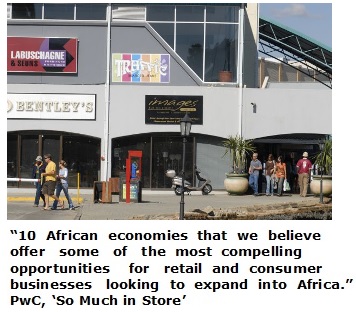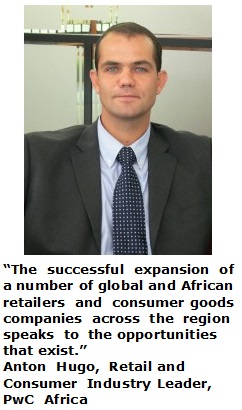 ReConnect Africa is a unique website and online magazine for the African professional in the Diaspora. Packed with
essential information about careers, business and jobs, ReConnect Africa keeps you connected to the best of Africa.
ReConnect Africa is a unique website and online magazine for the African professional in the Diaspora. Packed with
essential information about careers, business and jobs, ReConnect Africa keeps you connected to the best of Africa.


Prospects for African retail & consumer businesses remain positive: says PwC’s in-depth study into the make-up of Sub-Saharan Africa’s retail and consumer goods industries.
 Prospects for African retail & consumer businesses remain positive: says PwC’s in-depth study into the make-up of Sub-Saharan Africa’s retail and consumer goods industries
Prospects for African retail & consumer businesses remain positive: says PwC’s in-depth study into the make-up of Sub-Saharan Africa’s retail and consumer goods industriesAfrica’s economy has seen modest growth in the wake of falling commodity prices, slowing revenues and volatile currencies. The moderation in growth impacts a range of industries and sectors, including retail and consumer products that must contend with rising costs, and a fall in prices.
Despite the decline in growth, the long-term outlook remains positive. The economic growth predicted for 2016 and beyond in some African countries and the growth expected in Africa’s consumer market provides major opportunities for retail and consumer companies looking to the future. These are some of the highlights from a report released by PwC.
‘So Much in Store’
“As Africa has risen to prominence as an investment destination over the past several years, so the role of retail and consumer goods has taken on greater significance,” says Anton Hugo, Retail and Consumer Industry Leader, PwC Africa. “Sub-Saharan Africa (SSA) remains one of the fastest growing regions in the world and the successful expansion of a number of global and African retailers and consumer goods companies across the region speaks to the opportunities that exist.”
“However, Africa’s fortunes are very much tied to those of the global economy. Pressure on emerging market currencies coupled with a decline in oil and other commodity prices has seen pressure on government revenues and the ability of governments to increase social expenditure and wages in the public sector. African retailers will need to focus their efforts on operational efficiency and managing the effect on their operations of volatile currencies,” adds Edafe Erhie, PwC Partner in Nigeria.
PwC’s inaugural publication entitled ‘So much in store’, is an in-depth study into the make-up of SSA’s retail and consumer goods industries, and provides an outlook for the coming five years by focusing on 10 African economies that we believe offer some of the most compelling opportunities for retail and consumer businesses looking to expand into Africa: Cameroon, Ethiopia, Ghana, Côte d’Ivoire, Kenya, Nigeria, South Africa, Tanzania and Zambia.
Trends shaping the retail and consumer sector in SSA
Significant global megatrends will help drive the retail and consumer goods industries and create future opportunities. Africa’s demographic dividend, its growing middle class and rising income levels, and rapid urbanisation will all have a part to play in the continued growth of the retail sector across the continent.
Africa is home to more than one billion people which is expected to increase to more than two billion by 2050…this offers an opportunity for rapid economic growth.
Currently, Africa is home to more than one billion people which are expected to increase to more than two billion by 2050. Africa’s working age population is forecast to grow at a faster rate than its overall population. When the labour force grows more rapidly than the population dependent on it, resources become available for investment in economic development and personal consumption. This offers an opportunity for rapid economic growth.
More informed and healthier consumers
Changes in consumer lifestyles and ambitions are influencing purchasing behaviour and patterns, according to leading retailers. Overall, consumers in SSA are becoming more aspirational and brand-conscious. “Africans are becoming more connected to global trends than ever before as a result of growth in internet penetration and travel,” explains Hugo.
 Those that can afford it are also becoming more health-conscious, favouring nutritious and healthy foods.
Those that can afford it are also becoming more health-conscious, favouring nutritious and healthy foods.
Home-grown champions make their mark
Closer to home, African organisations are becoming dominant players in local markets and expanding their presence across the rest of the continent.
Informal trade continues to lead
For the foreseeable future informal retail will continue to dominate sales in SSA. With the exception of South Africa and Angola, it is estimated that upwards of 90% of sales in the focus countries is through informal channels such as markets, kiosks, table-top sellers and street hawkers.
“However, the industry is in the process of modernising with a number of western-style shopping centres taking shape in countries like Nigeria, Kenya and Ghana. It is also interesting to note that in some countries such as Ghana, Nigeria and Zambia, many of the malls are anchored by South African retailers. For some countries, the building of shopping malls is a challenging and expensive business due to the difficulties in securing land, resources, and the costs associated with building,” says Michael Mugasa, PwC Partner in Kenya.
Local production on the rise
Increasingly there is a growing movement towards local production. This trend is driven by a number of factors. These include, amongst others, political stability and government incentives to boost local manufacturing. Despite the opportunities, manufacturing in Africa comes with numerous challenges.
Supply chain optimisation
A critical success factor for retailers and consumer goods companies moving into many African countries has been their ability to implement supply chains that deal with the operational challenges that exist. “Given the size of Africa, supply chains tend to be complex and expensive,” says Hugo. “Other obstacles include poor transport, inadequate local supply capacity and the dominance of informal retail trade.”
Distribution
The dominance of informal trade and Africa’s large rural population makes distribution a complex exercise. However, as 90% of sales are made through informal channels, those that ignore this segment are missing out on a significant share of potential revenue. There are also many examples of companies that have introduced innovative ways of improving their distribution in various countries.
Hugo concludes: “Each country in Africa has its own value proposition. Smart investing in Africa means investors need to understand key regions and local markets. Despite these risks, investors and retailers will continue to see the African market as a huge opportunity.”
Top photo: Graeme Williams, mediaclubsouthafrica.com
